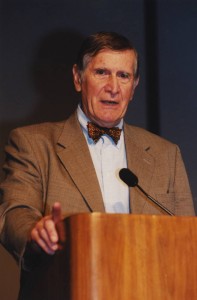
Judge A. David Mazzone speaks at the 2001 Honorary Degree Dinner. Judge Mazzone donated his papers related to the Boston Harbor Cleanup Case to UMass Boston in 2001 and was awarded an honorary Doctor of Laws degree as part of that year’s commencement exercises.
Boston’s harbor is clean. Or at least it’s a lot cleaner than it used to be.
According to a recent Boston Globe article, the “US District Judge Richard G. Stearns last month issued the 239th compliance order in the 1985 lawsuit that led to the Boston Harbor cleanup project, declaring an end to the construction phase of the massive combined sewer overflow project.” The Globe also notes that this is the “oldest active case in the federal court system in Massachusetts.”
The Boston Harbor Cleanup Case set into play one of the largest public works projects ever undertaken in New England, resulting in the construction of a new primary wastewater treatment center at Deer Island, facilities at Fore River Shipyard in Quincy to process sewage sludge, a tunnel from Nut Island to Deer Island, and a 9.5 mile outfall tunnel to discharge treated effluent offshore in Massachusetts Bay. These four major construction projects were designed to deal with the problem of untreated sewage water which had been dumped into Boston Harbor for decades. The Boston Harbor Cleanup Case was originally filed in three separate lawsuits, including a case that landed on the desk of Judge Paul Garrity of the Massachusetts Superior Court (University Archives and Special Collections holds the chambers papers related to another of Judge Paul Garrity’s cases, on the receivership of the Boston Housing Authority in the 1970s and 1980s). These separate lawsuits culminated in Federal District Judge A. David Mazzone’s 1985 ruling that made the cleanup of the Boston Harbor a non-voluntary, court-ordered mandate.
University Archives & Special Collections in the Joseph P. Healey Library at UMass Boston holds a range of materials related to the Boston Harbor and the Boston Harbor cleanup case, including the extensive chambers papers of Judge Mazzone, who had jurisdiction over the cleanup case from 1985 to 2004 and who passed away in October 2004.
Included among Judge Mazzone’s chambers papers are a total of 193 compliance orders (as the Globe notes, there would ultimately be 239 compliance orders) issued by Judge Mazzone between 1985 and 2004, as well as reports, audio-visual materials, and interviews with key figures in the cleanup case.
Interested in learning more about the environmental and polluted conditions of the Boston Harbor prior to the cleanup case? University Archives and Special Collections recently digitized this 1969 film from the records of the Volunteers and Friends of the Boston Harbor Islands, Inc. titled “Boston – Harbor/City/Islands” which explores the connections between the city and the harbor, including activities and histories of the Boston Harbor Islands.
The finding aid for the Judge Mazzone papers is available here and the finding aid for the records of the Volunteers and Friends of the Boston Harbor Islands, Inc. is here.
For questions about these collections or to schedule a research appointment, please contact library.archives@umb.edu or 617-287-5469.
University Archives & Special Collections in the Joseph P. Healey Library at UMass Boston collects materials related to the university’s history, as well as materials that reflect the institution’s urban mission and strong support of community service, notably in collections of records of urban planning, social welfare, social action, alternative movements, community organizations, and local history related to neighboring communities.
University Archives & Special Collections welcomes inquiries from individuals, organizations, and businesses interested in donating materials of an archival nature that that fit within our collecting policy. These include manuscripts, documents, organizational archives, collections of photographs, unique publications, and audio and video media. For more information about donating to University Archives & Special Collections, click here or email library.archives@umb.edu.